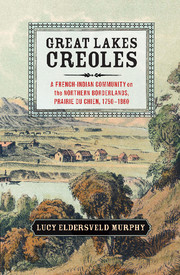 Great Lakes Creoles
Great Lakes Creoles Book contents
- Frontmatter
- Dedication
- Contents
- List of Tables
- List of Figures
- Acknowledgments
- Introduction
- 1 “The Rightful Owners of the Soil”
- 2 “To Intermeddle in Political Affairs”
- 3 “Damned Yankee Court and Jury”
- 4 Public Mothers
- 5 “A Humble … People”
- 6 Blanket Claims and Family Clusters
- Conclusion
- Epilogue
- Index
- References
2 - “To Intermeddle in Political Affairs”
New Institutions, Elections, and Lawmaking
Published online by Cambridge University Press: 05 September 2014
- Frontmatter
- Dedication
- Contents
- List of Tables
- List of Figures
- Acknowledgments
- Introduction
- 1 “The Rightful Owners of the Soil”
- 2 “To Intermeddle in Political Affairs”
- 3 “Damned Yankee Court and Jury”
- 4 Public Mothers
- 5 “A Humble … People”
- 6 Blanket Claims and Family Clusters
- Conclusion
- Epilogue
- Index
- References
Summary
In 1822, the newly created Borough Council of Prairie du Chien passed a law against “white persons … skulking or sneaking about after 10 oclock at night.” This remarkable ordinance, passed by the leaders of the Creole fur-trade community, is the most unique but not the only expression of resistance to a new political order imposed by the United States on a region that had both a strong Native American presence and a long allegiance to the French and British Canadian provinces. It marked the first phase of a series of Creole political adaptations that allowed them to express local values, thwart racialization, and express consensus before factionalism and demographic change altered their options within the democratic system.
The new régime brought major changes in government to Prairie du Chien at the local, territorial, and national level, changes that would affect the habitants personally, economically, and politically. It would alter their social relationships, shift local power dynamics, challenge their worldviews, and provide avenues for expression in unexpected ways. During the 1820s and ’30s, the ethnically and racially mixed residents of this old fur-trade town experimented with Yankee-style democracy and courts, mixed them with American Indian political practices and fur-trade traditions, and came up with surprising results. In some ways, we may see their actions as critiques of colonization and assertions of alternative concepts of governance; and in others, we can observe the processes of assimilation and acculturation. In addition, their participation in the political and judicial system may help to explain why they did not develop an identity as indigenous Métis people like their Canadian cousins. But it is a complex story.
- Type
- Chapter
- Information
- Great Lakes CreolesA French-Indian Community on the Northern Borderlands, Prairie du Chien, 1750–1860, pp. 65 - 107Publisher: Cambridge University PressPrint publication year: 2014


